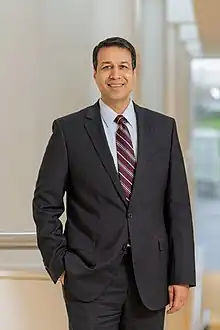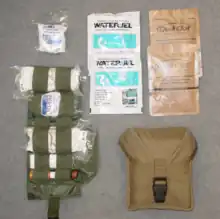Hasan B. Alam | |
|---|---|
 | |
| Born | August 29, 1966 |
| Nationality | American |
| Title | Chair, Department of Surgery, Northwestern University, Chicago, USA |
| Spouse | Tracy Alam |
| Children | Mayah and Aliya |
| Awards | American Heart Association Lifetime Achievement Award for Trauma Resuscitation Science |
| Academic background | |
| Education | Aga Khan University Medical College (1990) Uniformed Services University of the Health Sciences |
| Academic work | |
| Institutions | Harvard Medical School Massachusetts General Hospital Michigan Medicine (2012-2020) Feinberg School of Medicine Northwestern Memorial Hospital |
| Website | The Alam Laboratory |
Hasan Badre Alam is a trauma surgeon, surgeon-scientist, and a medical professor in the United States.[1] He is the Loyal and Edith Davis Professor of Surgery, the Chairman of Department of Surgery at the Feinberg School of Medicine (FSM)/Northwestern University, and the Surgeon-in-Chief at Northwestern Memorial Hospital (NMH) in Chicago.[2][3]
Alam is an academic trauma surgeon. He is an international leader in bench-to-clinic translational trauma research.[4][5][6] In 2017, he was awarded the American Heart Association Lifetime Achievement Award for Trauma Resuscitation Science.[7]
Biography
Early life and education
Alam was born in Quetta, Pakistan. He wanted to be a surgeon from early on in life. After completing medical education at the Aga Khan University Medical College, Pakistan in 1990, he moved to the United States for surgical training.[2][8]
Training and Medical Career
Dr. Alam is an American Board of Surgery-certified trauma and critical care surgeon.[9] He completed a surgical residency at the Washington Hospital Center/Georgetown University in Washington, D.C., which was known as the murder capital in the early 1990s.[10][4] While taking care of young trauma patients during residency training, Alam realized his passion for trauma surgery. There he also met his mentor, Peter M. Rhee, who served as a major inspiration.[11] After completing residency training, Alam received post-doctoral research training at the Uniformed Services University of Health Sciences (USUHS) in Bethesda, MD.[4] Prior to moving to the University of Michigan in 2012, Alam served as the Professor of Surgery at the Harvard Medical School in Boston, Massachusetts.[5] There he acted as the Founding Medical Director of Multi-Specialty Intensive Care Unit, and the Director of Surgical Critical Care Fellowship Program at Massachusetts General Hospital (MGH).[4] He was also the director of research in the Division of Trauma at MGH.[5] During his time at MGH, he received an Honorary master's degree (Artium Magistrum) from Harvard University.
Dr. Alam served as the Norman W. Thompson Professor of Surgery, and the Section Head of General Surgery at Michigan Medicine, Ann Arbor, Michigan from 2012 to 2020.[4][12] He now serves as the Chairman of the Department of Surgery at Northwestern Medicine in Chicago. "It's a bigger stage, more complex healthcare system, located in an iconic city. It puts you on a growth trajectory where you are learning new things and growing constantly. These new challenges keep you engaged and energized”, says Alam.[13] “If a patient enters a facility that has the Northwestern Medicine logo on it, they should rest assured that they will get the right care — no matter which door they enter,” he adds.[13]
He has delivered lectures at national and international forums on topics ranging from combat casualty care to achieving academic success in surgery.[11] In 2010, he was featured on the ABC television series Boston Med.[14] He served as the Chair of the Massachusetts Committee on Trauma from 2009 to 2012.[15] He is the vice-chair of the Multi-institutional Trials Committee for the American Association for the Surgery of Trauma.[16] He currently serves on the editorial board of multiple journals including the Annals of Surgery,[17] the Journal of the American College of Surgeons,[18] and the Journal of Trauma and Acute Care Surgery.[19]
Research and Clinical Interests
Dr. Alam's clinical focuses are in the areas of emergency general surgery, trauma, and surgical critical care. His research focuses on traumatic brain injury, hemorrhagic shock, cell preservation and response modulation to injuries, hemorrhage control, and development of novel treatments for sepsis.[4] His research is funded by various national funding agencies including the National Institutes of Health (NIH), the Office of Naval Research (ONR), and the United States Department of Defense (D.o.D).[20]

Alam has authored more than 350 peer-reviewed manuscripts with around 16,000 citations, and has the h-index of 66.[21] In 2001, in collaboration with the Office of Naval Research, Alam was the first to successfully test the hemostatic dressing QuickClot® for use on the battlefield. For him, this meant “your buddy has to stop the bleeding, not the medic, not the surgeon”.[22][23][24] Within months of testing, QuickClot® was deployed for use by the special operation forces in Afghanistan.[25] His work on QuickClot® has been featured in an interview on the surgery podcast series Behind the Knife.[26]
Alam's work on suspended animation models and therapeutic hypothermia as a treatment strategy to improve outcomes in trauma patients received international coverage.[27][28][29][30] By suspending hundreds of injured pigs in hypothermia for more than an hour each, Alam has proved that crucial time can be bought to fix lethal injuries without compromising the vital organs.[31][32][33] "With the pig essentially dead (in hypothermia), we've got hours to fix it", says Alam.[31] His work helped in the conception of a federally funded clinical trial on the use of profound hypothermia in patients with traumatic arrest.[34]
His ongoing research aims to create ‘survivors out of non-survivors’ using novel cell-preserving drugs that target epigenetic modulation to treat critically ill trauma patients.[35][36][37][38] The aim is to create an economical, shelf-stable and easy to administer treatment, in the form of a pill or an injection, that the soldiers can use on the battlefield to survive the critical first few hours of injuries.[6] “If we can sustain the patient through the first few hours, not only will they recover, but they can return to being contributing members of society ”, says Alam.[6] One such drug, valproic acid, is currently under clinical testing for use in hemorrhagic shock and traumatic brain injury.[39]
Dr. Alam holds more than 10 patents including the patent on 'portable hand pump for evacuation of fluids', which is used widely in hospitals around the world.[40]
The Alam Laboratory
Dr. Alam has led a trauma research laboratory that started at the Uniformed Services University and then moved to the Massachusetts General Hospital, before relocating to the University of Michigan, Ann Arbor.[34] Currently, the laboratory is housed in the Feinberg School of Medicine Campus in Downtown, Chicago. The Alam lab continues to produce quality research to improve trauma outcomes in both civilian and uniformed populations.[41]
References
- ↑ "US. Health News: Dr. Hasan B. Alam MD". Retrieved 20 April 2020.
- 1 2 Rohman, Melissa (24 March 2020). "Distinguished Surgeon Named Chair of Surgery". Northwestern University Feinberg School of Medicine.
- ↑ "Faculty Profile". www.feinberg.northwestern.edu. Retrieved 2020-09-07.
- 1 2 3 4 5 6 "Michigan Center for Integrative Research in Critical Care (MCIRCC): Hasan B. Alam, MD". Michigan Center for Integrative Research in Critical Care. 14 October 2019.
- 1 2 3 "New Appointments to Full Professor (4/7/11)". hms.harvard.edu. 7 April 2011.
- 1 2 3 "Limelight - Faculty Honor Awards (Medicine at Michigan)" (PDF).
- ↑ Leary, Marion; McGovern, Shaun; Dainty, Katie N.; Doshi, Ankur A.; Blewer, Audrey L.; Kurz, Michael C.; Reynolds, Joshua C.; Rittenberger, Jon C.; Hazinski, Mary Fran (2018). "The Latest in Resuscitation Science Research". Journal of the American Heart Association. 7 (2): e008589. doi:10.1161/JAHA.118.008589. PMC 5850173. PMID 29358196.
- ↑ "Board of Registration in Medicine - Physician Profile". profiles.ehs.state.ma.us.
- ↑ "Hasan Badre Alam MBBS | Michigan Medicine". www.uofmhealth.org.
- ↑ "Crime in Washington, D.C.", Wikipedia, 2020-04-15, retrieved 2020-05-04
- 1 2 "New Trends in Resuscitation; Hasan B Alam, MD". YouTube.
- ↑ "Faculty | Trauma Burn Center". traumaburn.org.
- 1 2 "Trauma Trailblazer | Northwestern Medicine Magazine". Retrieved 2021-06-06.
- ↑ "ABC Channel. Boston Med, Episode 6. Primetime show featuring real life medical cases, including trauma patient treated by Dr. Alam at the Massachusetts General Hospital. July 29, 2010". YouTube.
- ↑ "CAMTRAST | Hasan Alam, M.D." camtrast.med.umich.edu.
- ↑ "Committees". The American Association for the Surgery of Trauma. 23 June 2016.
- ↑ "Editorial Board : Annals of Surgery". journals.lww.com.
- ↑ "JACS Editorial Board". American College of Surgeons.
- ↑ "Editorial Board : Journal of Trauma and Acute Care Surgery". journals.lww.com.
- ↑ "Speakers & Panelists – CTTACC".
- ↑ "Hasan B. Alam - Google Scholar". scholar.google.com. Retrieved 2020-09-09.
- ↑ Kolata, Gina (30 March 2003). "A NATION AT WAR: MILITARY MEDICINE; Armed With New Tools and Tactics, Doctors Head to the Battlefield". The New York Times.
- ↑ Alam, HB; Uy, GB; Miller, D; Koustova, E; Hancock, T; Inocencio, R; Anderson, D; Llorente, O; Rhee, P (June 2003). "Comparative analysis of hemostatic agents in a swine model of lethal groin injury". The Journal of Trauma. 54 (6): 1077–82. doi:10.1097/01.TA.0000068258.99048.70. PMID 12813325.
- ↑ "Made-for-the-military products put brakes on bleeding - CNN.com". edition.cnn.com.
- ↑ "Buying Time | Surgery | Michigan Medicine". Surgery. 4 August 2016.
- ↑ "Behind The Knife: The Surgery Podcast: #125: Dr. Hasan Alam on QuickClot, the "Golden Hour", and EPR". behindtheknife.libsyn.com.
- ↑ Murphy, Kate (9 June 2014). "Killing a Patient to Save His Life". The New York Times.
- ↑ "Freezing A Body For Surgery Could Save Lives". NPR.org.
- ↑ "Doctors are ready to test temporary 'suspended animation' to save people with severe injuries". Public Radio International.
- ↑ Blech, Jörg (16 September 2005). "MEDIZIN : Ausflug ins Jenseits - DER SPIEGEL 38/2005". Der Spiegel. Retrieved 2020-05-04.
- 1 2 WIRED Staff (2006-07-01). "Stuck Pig". Wired. ISSN 1059-1028. Retrieved 2020-05-04.
- ↑ Trivedi, Bijal. "Suspended animation: putting life on hold". New Scientist. Retrieved 2020-05-04.
- ↑ Twilley, Nicola. "Can Hypothermia Save Gunshot Victims?". The New Yorker. Retrieved 2020-05-04.
- 1 2 "Research | Surgery Research | Michigan Medicine". Surgery Research. 21 December 2018.
- ↑ "Novel Prosurvival Strategies Enhance Prolonged Field Care". cdmrp.army.mil.
- ↑ Alam, Hasan. "Modulation of Acetylation in the Treatment of Lethal Injuries". Grantome.
- ↑ Alam, HB (July 2017). "Trauma care: Finding a better way". PLOS Medicine. 14 (7): e1002350. doi:10.1371/journal.pmed.1002350. PMC 5515406. PMID 28719633.
- ↑ "Highlights from the 2015 Western Trauma Association Meeting - Podcast #49 - EP Traumacast - The Eastern Association for the Surgery of Trauma". www.east.org. Retrieved 2020-05-04.
- ↑ Georgoff, Patrick E.; Nikolian, Vahagn C.; Bonham, Tess; Pai, Manjunath P.; Tafatia, Celia; Halaweish, Ihab; To, Kathleen; Watcharotone, Kuanwong; Parameswaran, Aishwarya; Luo, Ruijuan; Sun, Duxin (Feb 2018). "Safety and Tolerability of Intravenous Valproic Acid in Healthy Subjects: A Phase I Dose-Escalation Trial". Clinical Pharmacokinetics. 57 (2): 209–219. doi:10.1007/s40262-017-0553-1. ISSN 1179-1926. PMC 5699961. PMID 28497259.
- ↑ "Hasan B. Alam Inventions, Patents and Patent Applications". Justia Patents.
- ↑ "Google Scholar - Hasan Alam". scholar.google.com.